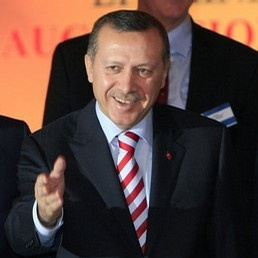Iran Stopped in Turkish Energy Terminal

Policies of the Turkish Prime Minister Recep Tayyip Erdogan and Turkish President Abdullah Gul toward national interests of their country have proved that they are pragmatist and realist in their policies more than any pragmatist state. Erdogan and Gul are following these methods to increase Turkey’s power in the region and in Middle East countries; moreover, to join European Union using support and strategic relations with United States.
They are imposing Islamic approach of their party to play role as a mediator between Islamic countries and Europe. In fact Turkey is at the crossroad of Europe and several volatile, strategically and economically important regions, including Russia, the Caspian region and the Middle East. Also, Turkey is trying to be engaged in recreation of this political role in economy, especially energy sector.
As a matter of fact, Turkey’s geopolitics is serving the government to replay the historical role of Istanbul as Trade Bridge between Asia and Europe. Although Turkey follows energy transit from producer countries to consumer countries in Europe, at the same time it devotes attention to energy security as strategic aim.
This strategy has come up with increase of economic growth rate. As Turkey’s economy has expanded in the last years, the consumption of oil has increased. The expected growth rate in oil consumption is expected to continue at a rate of about 2-3% per year. Turkey’s oil consumption in 1998 was 76 million tones of oil equivalent. It is expected to reach 179 million tones in 2010 and 319 in 2020. The 20 billion cubic feet of natural gas being produced in Turkey in 2000 met only 3.8% of domestic gas consumption. The remaining gas consumption was either imported by pipelines or as liquefied natural gas. Turkey’s natural gas consumption is expected to grow rapidly, quadrupling within the next 20 years, with 1,400 bcf gas consumption projected for the year 2020.
Thus, Turkey’s increasing energy demands have given it a strong interest in developing energy ties with its neighbors such as Russia and energy producing countries in the Middle East and the Caspian region.
Turkey–Iran relations are bilateral due to increasing of Turkey’s gas demand and the Turkish attempt to be a terminal of energy in the region. At the same time Iran needs to export gas to Europe from Turkey. Thus they have established energy relations.
In 1996 Turkey signed a contract with Iran for natural gas deliveries, which began in December 2001 via a pipeline from Tabriz to Ankara. Also Turkey has signed a deal with Iran to purchase 23 billion dollars worth of gas over the next two decades. And during Recep Erdogan’s premiership, Turkey’s energy minister visited Iran to sign energy deals, including the establishment of a joint Turkish-Iranian company to carry up to 35 billion cubic meters of Iranian natural gas via Turkey to Europe.
Although Iran and Turkey have signed many energy agreements, only exporting gas from Iran to Turkey agreement is going on, even so this ongoing agreement has conflicted with some problems that they are not only result of Iran’s problems in gas producing and exporting, but influenced by political affairs due to Turkey’s foreign policy. As a matter of fact, Turkey’s energy policy is determined by its foreign policy, thus it can changed its energy relations with countries.
In fact, Iran’s nuclear program is the most important factor that affects Iran-Turkey relations. According to Turkish approach, Iran’s achievement in nuclear weapon will change the balance of power in the region and this issue will be against Turkish strategy. Thus, the Turkish government is trying to use its relations with Israel and U.S. against Iran. They want to be sure that Iran is controlled by the United States and at the same time Turkey wants to take U.S. support for its plans. Thus they have stopped pipeline project with Iran but at the same time they have taken U.S. support for Baku -Ceyhan pipeline.
Also, based on Turkey–U.S. relations, the Turkish government has to transport oil and gas of Caspian Sea to Europe. Turkey has also increased its energy relations with Saudi Arabia and Iraq as an alternative due to Iran–U.S. crisis with considering stoppage of gas export to Turkey.
As a result of this policy, Iran will lose its interest in Turkey as an energy market as well as losing the opportunity of gas transit to Europe through Turkey. In this situation, strategic relations between Iran and Turkey will be changed to demand and supply relation. However, at the same time some of Iran’s rivals in Caspian Sea and Persian Gulf will take advantage of Iran’s absence. Thus, Iran’s interests will be lost again due to its disturbed communication with international community, where Iran has faced many problems with its foreign policy.

